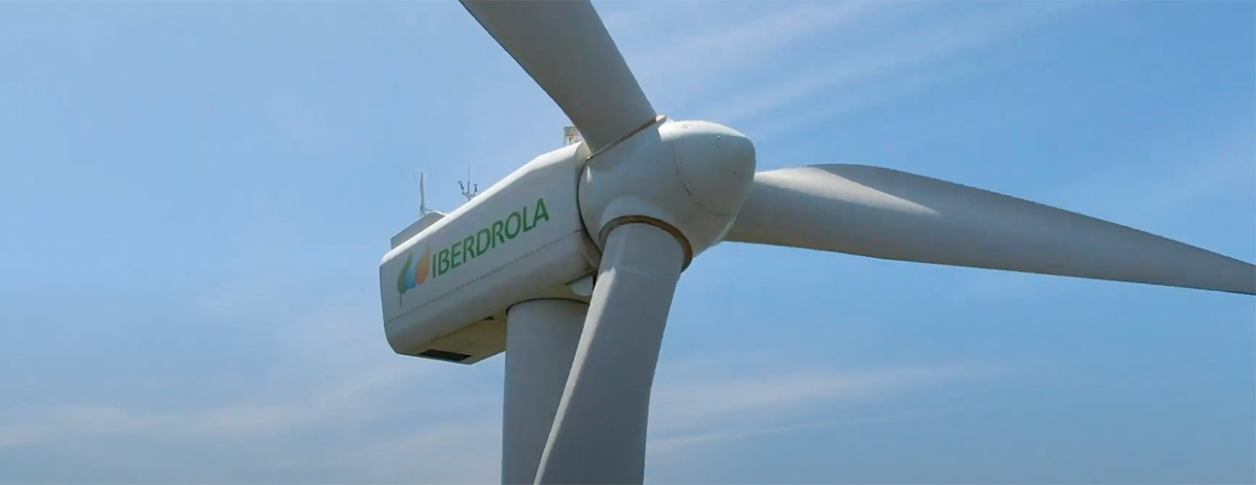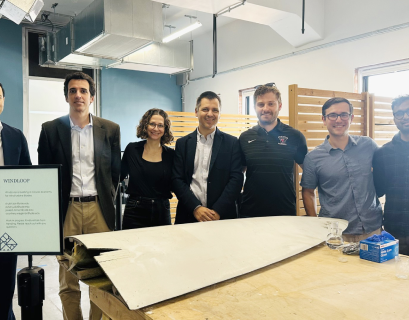Sustainable model and circular economy
The circular economy, at the core of our sustainable business model
The circular economy implies a cultural change in the way we understand the production and consumption system in order to address a lack of resources, environmental impact, value creation and employment.

Iberdrola, positive towards nature
At Iberdrola, we have set ourselves the goal of being positive with nature in 2030. To this end, we have defined three strategic sustainability areas: climate action, biodiversity protection and circular economy.
The economic model of circular economy is presented as a system of infinite use of resources, instead of the linear model that has existed until now. Iberdrola therefore prioritises the reduction in the use of new raw materials through process efficiency, product life extensions, and a firm commitment to the reuse and recycling of materials.
For the Iberdrola Group, the circular economy is therefore a key element for sustainable development and represents an opportunity as a driver for climate action and energy transition.
This is achieved by acting on the pillars of the circular economy:
- Consumption.
- Waste.
- Energy efficiency.
- CO2 emissions.

We are leaders in the recycling of renewable energy components, one of the greatest challenges in our sector.
What is the circular economy?
The circular economy is a system of production and consumption that involves reusing, repairing or recycling existing materials and products as many times as possible, creating added value and extending their life cycle as much as possible.
It is therefore a sustainable economic model that reduces the environmental footprint of production processes by reducing the extraction of raw materials, energy consumption and waste generation.
It implies a cultural change that affects all sectors of society and at the same time is a source of opportunities promoting competitiveness, innovation and generation of new employment needs.
The circular economy model at Iberdrola
The Iberdrola Group has been advancing in this field for some time throughout the entire value chain, i.e., both through the business model and the way of working with suppliers and customers.
We are committed to closing the circle in Iberdrola's value chain by applying the four 'R's: redesign, reduce, reuse and recycle. In this way, we will have:
- A reduction in raw material consumption.
- A longer service life of goods and equipment, as well as the possibility of providing them with a second life.
- Minimisation of waste generation by providing adequate treatment.
Iberdrola will therefore seek to avoid the use of resources throughout its value chain as much as possible. That is, the available resources will be used for as long as possible and the various businesses of Iberdrola, its customers, and its suppliers will be involved.
Circular economy model at Iberdrola
Lines of work
To implement the above, the following levers (the four 'R's) will be applied in Iberdrola's value chain to close the circle of the circular economy, through the following lines of work.
At Iberdrola we will focus on:
- Significantly reducing the consumption of raw materials.
- No renewable waste being sent to landfill.
- Maximising the use of goods and equipment and finding a second life for them.
- Increasing circularity at Iberdrola through investment in R&D&I.
With clients we will assist in the reduction of:
- Emissions, through electrification of mobility and heat.
- Consumption, providing solutions that increase energy efficiency.
Finally, we will work with suppliers along the following lines:
- Green purchasing, in which the use of products with a minimum environmental impact, as well as other sustainable criteria, will be a priority.
- Reducing carbon footprint.
Circular economy plan 2030
Lines of work based on the 4 R’s (Redesign, Reduce, Reuse and Recycle)
Latest news about our circular economy
Targets to 2030
The above lines of work are specified in the following objectives, for each part of the value chain.
Iberdrola's targets are:
- Reduction of consumption of primary raw materials by 50%.
- Reduction of fossil fuel consumption and emissions by developing a 100% sustainable light fleet.
- 100% reuse and recycling of photovoltaic blades and panels.
- Continue with the investment effort in R&D&I and increase it in circular economy (+50%).
- Promote the improvement of energy efficiency in both operational and internal processes.
- Circular construction and dismantling, giving the best possible value to the waste generated.
On the customer side, the objectives are:
- Boosting energy efficiency:
- Decarbonising mobility.
- Residential and industrial heat electrification.
- Awareness-raising activities with residential and industrial customers.
- Promoting the use of renewable fuels in industry, such as green hydrogen.
And, as for suppliers:
- Increased use and consumption of materials with low environmental impact: recycled and recyclable.
- Inclusion of eco-design criteria, life cycle analysis and environmental product declaration.
- Scope 3 emission reductions.
The circular economy today in the value chain
In line with its sustainability policy, Iberdrola has been participating in circular economy actions involving its entire value chain for several years. The main cases are as follows:
Iberdrola
- Recycling elements of the energy transition (blades, photovoltaic modules, batteries, etc.) by developing industrial partnerships to find solutions, such as EnergyLoop and the Brio project.
- 50% of non-hazardous waste is reused or recycled (2020).
- Reduce emissions through decarbonisation of non-electrifiable uses. In 2022, green hydrogen generation began in Puertollano (20 MW).
- Reduce fossil fuel consumption by installing renewable energy.
- Reduce and reuse waste from the decommissioning of the coal-fired power plants in Velilla and Lada, achieving a recovery rate of around 90%.
- Reusing vehicle batteries to improve the performance of recharging points with BeePlanet.
Clients
- R+D+i projects for electric bus charging points, in the Remourban project.
- Electric mobility, with the deployment of charging points in homes, businesses and on public roads, reaching 150,000 by 2025.
- Decarbonisation of non-electrifiable industrial uses, such as fertiliser production, public transport in Barcelona or the ceramics sector, all emission-free.
- Residential and industrial photovoltaic installations for self-consumption.
- Electrification of residential and industrial heat through much more efficient heat pumps.
- Different Smart products to achieve greater energy efficiency.
Suppliers
- Redesign, using eco-design criteria to minimise environmental impact, as well as the use of environmental product declarations in wind farms.
- Reduce, recycle and reuse.
- Replacing blades with repaired ones and giving priority in tenders to those who offer solutions to recycle rather than dispose of waste.
Spain's circular economy strategy
In 2017 Iberdrola joined the Pact for a Circular Economy: The commitment of economic and social agents 2018-2020, which the Spanish Government signed with the European Commission within the framework of the European Strategy for Growth 2020.
This Pact was the start of the creation of a Spanish circular economy strategy (EEEC), which is fully aligned with the objectives of the European Union's action plans, as well as the European green pact and the 2030 agenda for sustainable development.
To develop this strategy, the 1st Circular Economy Action Plan 2021-2023 is in force, which consists of five axes and three lines of action.
Iberdrola is participating in this strategy through the circular economy commission of the Spanish Chamber of Commerce, which is one of the entities of the circular economy advisory council.
More about the circular economy
What is the circular economy?
The circular economy takes into account the production processes and proposes to reuse, repair or recycle by increasing sustainable manufacturing and consumption.
More about the circular economyWhat is the circular economy?
The circular economy takes into account the production processes and proposes to reuse, repair or recycle by increasing sustainable manufacturing and consumption.
More about the circular economy




 Life cycle analysis approach
Life cycle analysis approach




